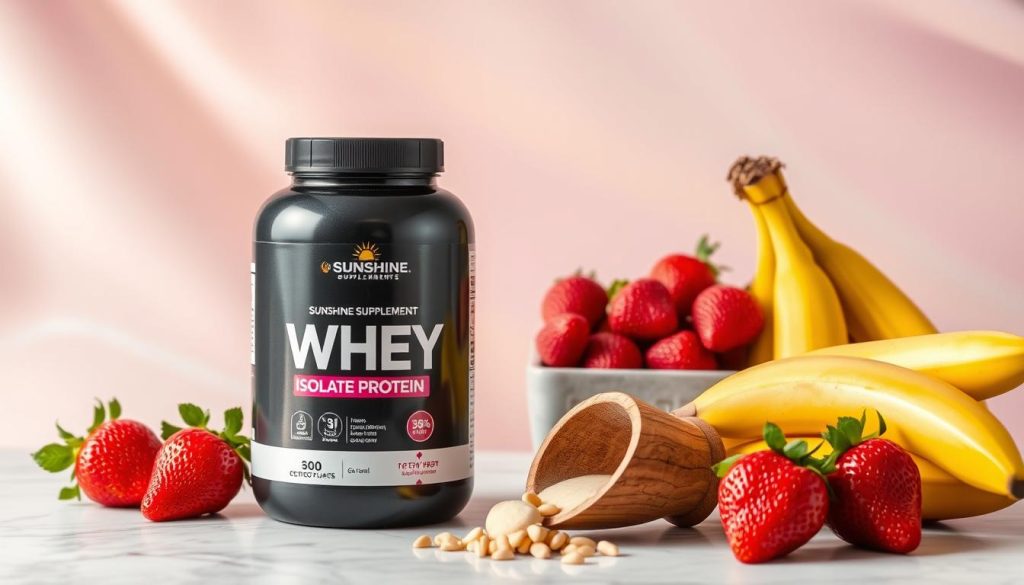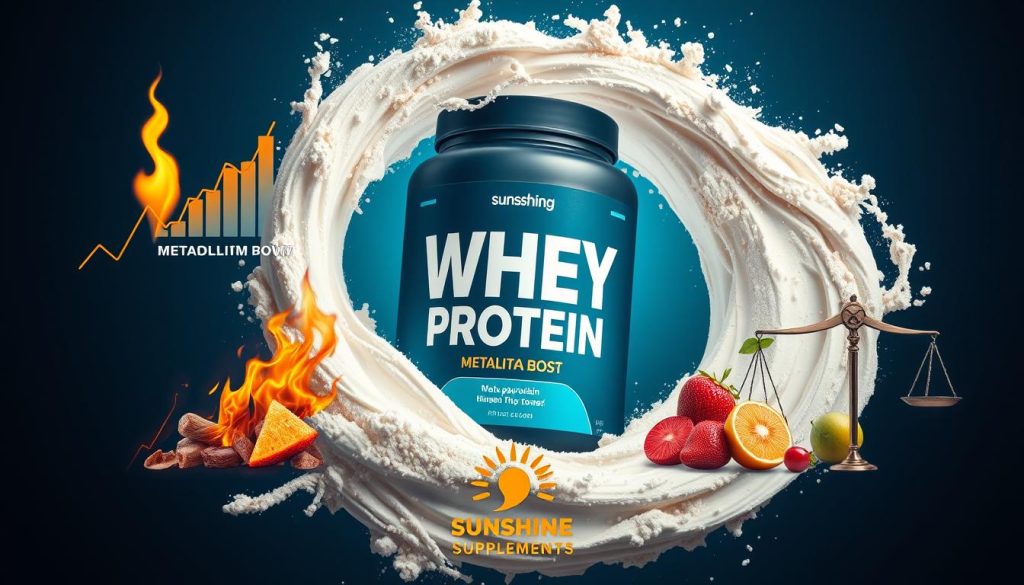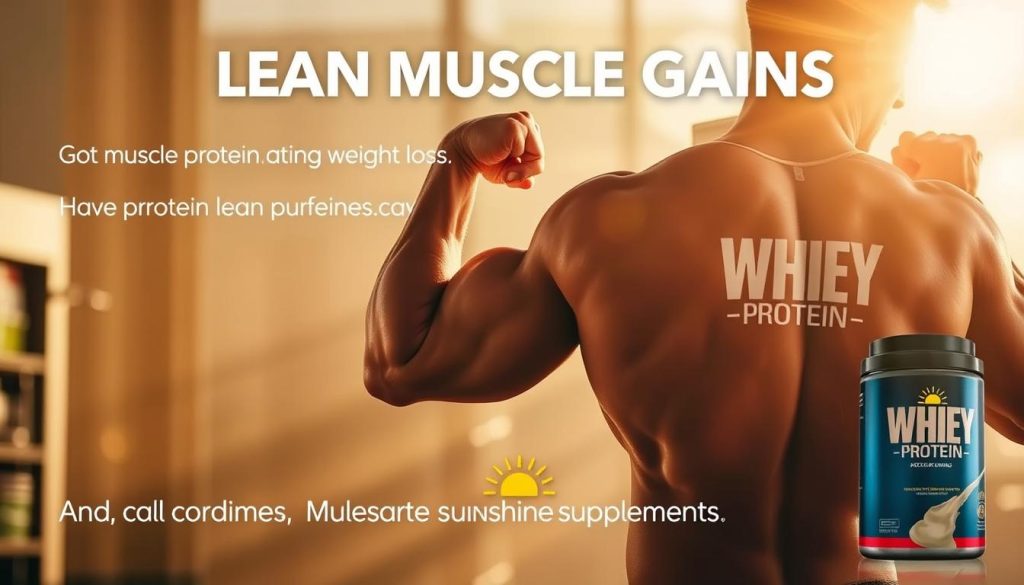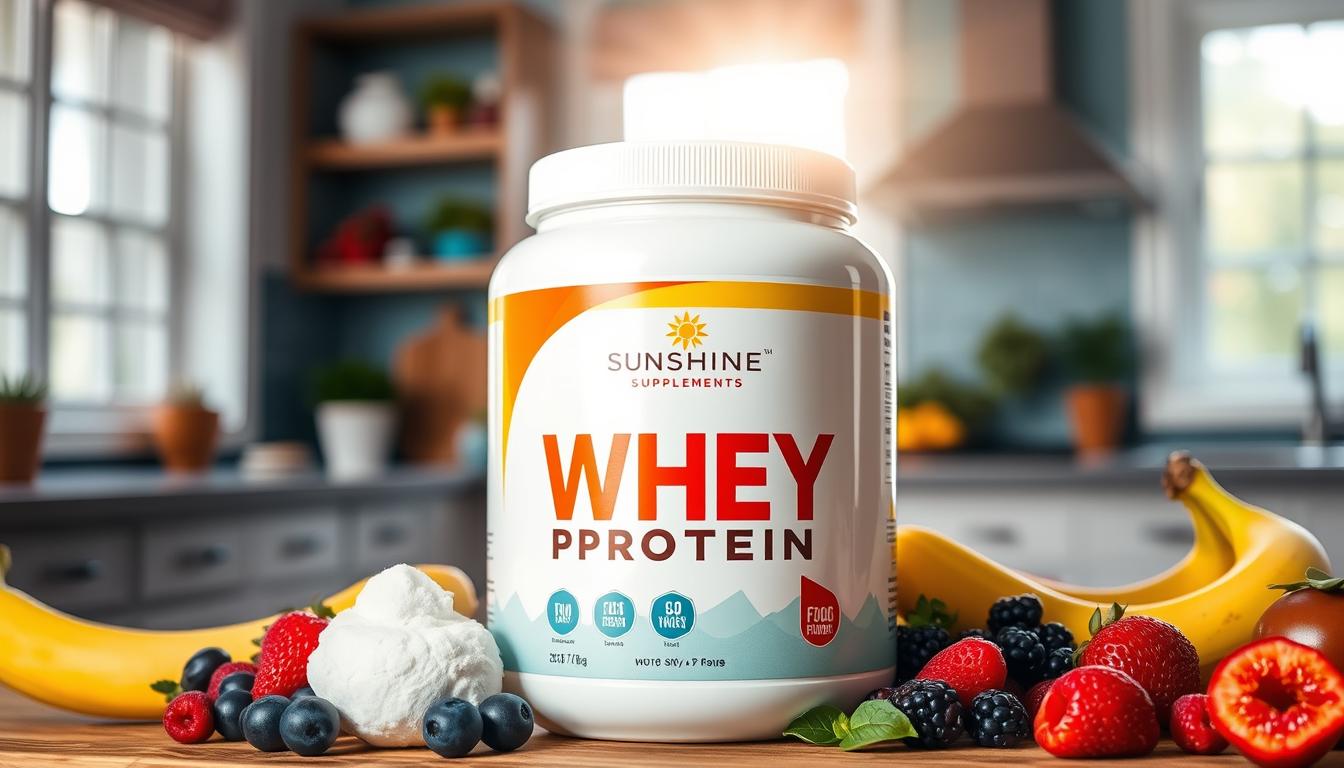In the United States, over 25% of adults are obese. This shows how hard it is for many to manage their weight. But, there’s a powerful ingredient that might help: whey protein. It comes from milk during cheese-making and has all nine essential amino acids. This makes it great for losing weight and reaching fitness goals.
Whey protein is absorbed fast by the body. It’s a quick way to fuel your muscles and boost your health. Studies show it can help you lose about 8 pounds (3.5 kg) and build lean muscle. It’s a key ally in your weight loss journey.
Key Takeaways
- Whey protein is a complete protein containing all nine essential amino acids, making it a highly effective tool for weight loss and muscle maintenance.
- Consuming whey protein can lead to weight loss of around 8 pounds (3.5 kg) while increasing lean muscle mass.
- Whey protein is quickly absorbed by the body, providing a fast and efficient way to fuel your muscles and support your overall health.
- Whey protein can help suppress appetite, boost metabolism, and support muscle recovery, all of which contribute to successful weight management.
- Incorporating whey protein into your diet can be a simple and effective way to achieve your weight loss and fitness goals.
Understanding Whey Protein: The Foundation of Weight Loss
Whey protein comes from milk’s liquid part. It’s special because it has all nine essential amino acids, making it a complete protein. It’s also packed with leucine, which helps your muscles grow and stay strong.
The Science Behind Protein and Weight Loss
Many studies have shown whey protein’s benefits for losing weight and improving body shape. A 2022 meta-analysis found that whey protein can help you lose body fat. It also helps keep blood sugar levels stable, as seen in a 2022 study with type 2 diabetes patients.
Complete Amino Acid Profile Benefits
Whey protein’s complete amino acid profile offers many benefits. It’s digested and absorbed quickly, making it great for muscle recovery and growth. Research shows that whey protein after workouts can boost muscle growth and strength.
It also has immunoglobulins and lactoferrin, which boost your immune system and reduce inflammation. This makes whey protein a great supplement for your health and weight loss goals.

“Whey protein has been recognized as a beneficial protein source for the aging population, as noted in a 2020 review in Experimental Gerontology.”
How Whey Protein Supports Weight Management
Adding whey protein to your diet can change your weight loss game. It helps control your appetite, keeps your lean muscle mass intact, and boosts your metabolism.
Research shows that whey protein can lead to losing about 8 pounds (3.5 kg) while building lean muscle. Its complete amino acid profile and ability to make you feel full are key to managing hunger and cravings.
Whey protein also improves cholesterol levels, which is good for your heart. This makes it a great addition to your health and wellness plan.
The Science Behind Whey Protein and Weight Management
Whey protein’s special properties make it a strong ally in weight loss. Here’s how it works:
- Appetite Control: Whey protein reduces hunger and cravings, making you feel full and less likely to overeat.
- Muscle Preservation: It helps keep your lean muscle mass during weight loss, so you lose fat, not muscle.
- Metabolism Boost: Whey protein increases your metabolic rate, helping you burn calories more efficiently and lose weight faster.
| Whey Protein Concentrate | Whey Protein Isolate |
|---|---|
| Contains higher levels of lactose and fat | Has lower levels of lactose, making it more suitable for those with lactose intolerance |
| May be used in a wider range of products, such as protein shakes, bars, and infant formula | Often preferred for weight loss due to its higher protein content and lower levels of fats and carbohydrates |
| Generally less expensive than whey protein isolate | More expensive due to additional processing steps |
By adding whey protein to your diet, you can use its benefits to help manage your weight and improve your health.
The Power of Whey Isolate Protein Supplement
Whey protein isolate is a top choice for sports nutrition and weight management. It has over 90% pure protein, unlike whey protein concentrate. This high protein content makes it great for those who want to increase their protein intake without extra lactose, fat, or carbs.
Benefits of Whey Isolate vs. Concentrate
Whey protein isolate is more refined than concentrate. It has almost no fats, carbs, cholesterol, or lactose. This makes it perfect for those who can’t digest lactose or are watching their macronutrients. It also helps build muscle faster and recover better than whey concentrate.
Choosing the Right Whey Isolate Product
When picking a whey isolate, look for one that’s minimally processed. It should also be free from added sugars and artificial ingredients. The quality of the whey isolate affects how well it helps you reach your fitness and weight loss goals.
Optimal Dosage and Timing
The best amount of whey isolate is 1-2 scoops (25-50 grams) a day. This depends on your needs and goals. Taking it around your workout time can help with muscle growth and recovery.
Adding whey isolate to your diet can really change your sports nutrition and weight management game. Its high protein, low lactose, and quick absorption help with muscle growth, recovery, and feeling full. This can aid in weight loss or keeping your weight stable.
Metabolism Boost and Appetite Control
Whey protein is key for weight loss. It helps boost your metabolism and control your appetite. This makes it a powerful tool for losing weight.
Whey protein has a high thermic effect. This means your body burns more calories when digesting it. Studies show it can increase calorie burning by up to 30%.
Whey protein also affects hunger hormones like peptide YY and ghrelin. These hormones help you feel full longer. This way, you eat fewer calories during the day.
“Whey protein’s unique properties make it an exceptional tool for boosting metabolism and managing appetite, both of which are essential for successful weight loss.” – Registered Dietitian, Sarah Johnson
Whey protein’s thermic effect and appetite control work together. This creates a powerful synergy for weight loss. Adding whey protein to your diet can be a game-changer. It helps you achieve a calorie deficit and reach your weight goals.

Muscle Preservation During Weight Loss
Keeping lean muscle mass is key when you’re losing weight. Whey protein, a top-notch protein supplement, can help you keep and even grow lean muscle, even when you’re eating fewer calories.
Understanding Lean Muscle Mass
Lean muscle mass gives you a toned look. It also speeds up your metabolism, helping you burn more calories, even when you’re not moving. Adding whey protein to your diet can help you keep and even grow lean muscle, even as you lose weight.
Protein Synthesis and Recovery
Whey protein is great for muscle recovery after working out. It boosts muscle repair and growth. This is vital when you’re losing weight, as your body might try to use muscle for energy. Whey protein stops this, keeping your muscles strong.
Training Benefits for Fat Loss
Using whey protein with resistance training can greatly increase lean body mass, strength, and power. This boosts your physical performance and helps with fat loss. The more muscle you have, the more calories you burn, making weight loss easier.
Remember, lean muscle gains, post-workout recovery, and resistance training are all important for losing weight. Add whey protein to your diet and workouts to get the best results and keep your muscle during weight loss.

Incorporating Whey Protein Into Your Diet
Whey protein is easy to add to your daily meals. It’s great for shakes before or after workouts and as meal replacements. It’s a convenient, nutritious way to help you lose weight.
Try swapping one meal for a protein shake to manage your weight. Aim for 1.2 to 2.0 grams of protein per kilogram of your body weight. This can make you feel full longer, reduce hunger, and keep your muscles lean while eating fewer calories.
You can also mix whey protein into your favorite dishes. Make protein-rich smoothies, bake muffins or cookies, or add it to oatmeal. There are many ways to use whey protein in your meals.
| Whey Protein Form | Protein Content |
|---|---|
| Whey Protein Concentrate | 70-80% protein |
| Whey Protein Isolate | 90% or more protein |
When picking a whey protein, think about what you need. If you’re lactose intolerant, whey protein isolate is a good choice. It has very little lactose. Always choose a high-quality, tested product for safety and purity.

Adding whey protein to your diet is a smart move for weight loss. You can use it in shakes, recipes, or both. It helps you stay full, keeps your muscles strong, and supports your weight loss goals.
Common Mistakes and How to Avoid Them
Adding protein intake to your weight loss plan can really help. But, it’s important to steer clear of common errors. One big mistake is eating too much protein, which can add too many calories and harm your kidneys. It’s key to match your protein intake to your body’s needs and not use supplements as all your meals.
Timing and Dosage Errors
When you eat protein matters a lot for building muscle and recovery. Eating protein at regular times throughout the day can help your muscles grow. Drinking whey protein within 30-60 minutes after working out can also boost muscle growth and recovery.
Quality and Storage Issues
Choosing the right supplement quality is critical. Pick high-quality whey protein and store it right to keep it effective. Watch out for protein powders with extra amino acids or additives. This might mean they’re using tricks to make it seem like there’s more protein than there is.
Mixing and Consumption Tips
How you mix and drink your whey protein can affect how well it works. Mixing it with foods like granola or oats can slow down how your body absorbs it. Try mixing it with cold water or milk for better taste and texture. Drinking enough water while taking whey protein is also important for keeping nutrients in check.
By knowing these common mistakes and following good advice, you can get the most out of whey protein. This will help you reach your weight loss goals while keeping your diet balanced and healthy.
Scientific Research and Studies
Many studies have shown that whey protein helps with weight loss and muscle growth. A study in the Journal of the American College of Nutrition found that whey protein reduced cravings and calorie intake in overweight people. This was compared to those who didn’t take whey protein.
Another study in the European Journal of Clinical Nutrition found that whey protein lowered LDL and total cholesterol. This was over a 12-week period. These results show that whey protein can help with weight management and heart health.
| Whey Protein Composition | Percentage |
|---|---|
| Beta-Lactoglobulin | 50-55% |
| Alpha-Lactalbumin | 15-20% |
| Immunoglobulins | Less than 15% |
| Bovine Serum Albumin | 5-10% |
| Lactoferrin | Less than 1-2% |
Whey protein also helps with muscle growth and recovery. A study showed that taking whey protein before or after exercise boosts muscle protein synthesis. This leads to better muscle recovery and growth.
“The key amino acid stimulating muscle protein synthesis in whey protein is leucine, which likely contributes to its effectiveness compared to other protein supplements like soy or casein.”
But, too much whey protein can harm the liver and kidneys, mainly in those who don’t exercise much. It’s wise to talk to a doctor before adding whey protein to your diet. This is even more important if you have health issues.
Conclusion
Starting your weight loss journey? Adding whey protein to your diet can help a lot. It controls hunger, boosts metabolism, and keeps muscles strong. This makes it a great addition to your health and fitness plans.
Whey isolate has lots of protein and few extras, while whey concentrate has a good mix of nutrients and tastes creamier. Both can help with whey protein benefits and your weight loss journey. Try different types to see what works best for you.
Whey protein isn’t a quick fix, but it’s a useful tool for a healthier life. Use it with a balanced diet, exercise, and a focus on wellness. You’ll be on the path to reaching your fitness goals.




